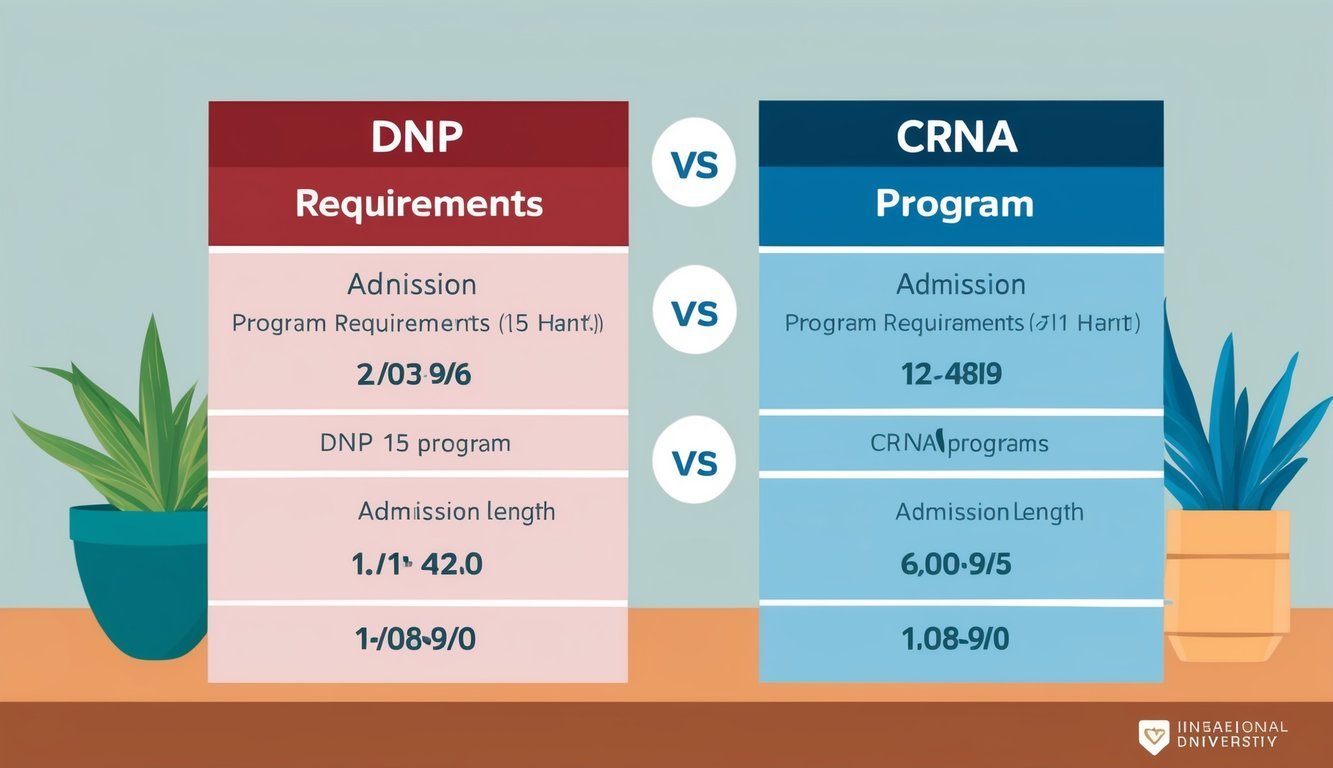When considering advanced nursing careers, you may find yourself weighing the options between a Doctor of Nursing Practice (DNP) and a Certified Registered Nurse Anesthetist (CRNA).
The primary distinction lies in their roles: a DNP focuses on clinical practice, healthcare leadership, and improving patient outcomes, while a CRNA specializes in anesthesia care.
Understanding these differences is crucial in determining which path aligns best with your career aspirations.
If you already hold a Master of Science in Nursing (MSN) or have experience in nursing, pursuing a DNP can enhance your qualifications for leadership roles in various healthcare settings.
On the other hand, if you are passionate about anesthesia and wish to specialize, the CRNA path offers a more focused trajectory with lucrative earning potential.
For example, CRNAs enjoy much higher average salaries compared to nurse practitioners.
To make an informed choice, consider factors such as education requirements, job responsibilities, and career growth.
Resources like Nurse.org and Indeed provide valuable insights into both career paths, helping you navigate your decision more effectively.
Educational Pathways and Degrees
Understanding the educational pathways available can clarify the distinctions between a Doctor of Nursing Practice (DNP) and a Doctorate of Nurse Anesthesia Practice (DNAP).
Both degrees cater to Advanced Practice Registered Nurses (APRNs) but have specific requirements and focuses.
Bachelor’s and Master’s Degrees
The journey to becoming a Nurse Anesthetist or pursuing a DNP typically begins with a Bachelor of Science in Nursing (BSN).
After obtaining a BSN, you must pass the NCLEX-RN exam to become a Registered Nurse (RN).
For those aiming for a DNP or DNAP, a Master of Science in Nursing (MSN) degree is often required.
The MSN equips you with advanced knowledge in nursing and clinical practice.
In the case of CRNA programs, a focus on anesthesia is vital.
Here’s a brief overview:
| Degree Level | Required Degree | Key Focus |
|---|---|---|
| Bachelor’s | BSN | Basic nursing and patient care |
| Master’s | MSN | Advanced nursing concepts |
Doctorate Level Education
Once you have an MSN, you can pursue either a DNP or DNAP.
A DNP focuses on advanced practice nursing, leadership, and implementing evidence-based practice in various healthcare settings.
Conversely, a DNAP is tailored specifically for Nurse Anesthetists and emphasizes anesthesia-specific education.
Both programs are considered terminal degrees, indicating the highest level of education in their fields.
Candidates often have different prerequisites depending on the program.
For instance, CRNA applicants typically need significant RN experience and may be expected to have a background in critical care.
| Doctorate | Focus Area | Example Program |
|---|---|---|
| Doctor of Nursing Practice (DNP) | Advanced practice nursing | DNP programs at accredited institutions |
| Doctorate of Nurse Anesthesia Practice (DNAP) | Nurse anesthesia | DNAP programs with a strong clinical component |
Certification and Accreditation
Certification is crucial for both paths.
For CRNAs, the National Certification Examination (NCE) administered by the NBCRNA is required.
Certification validates your competency in anesthesia practice.
DNP graduates often seek certification from the American Nurses Credentialing Center (ANCC) or similar bodies.
Accreditation of educational programs is essential.
Programs should be recognized by the Council on Accreditation (COA) and other relevant organizations to ensure quality education.
| Certification | Governing Body | Required For |
|---|---|---|
| NCE | NBCRNA | CRNAs |
| ANCC Certification | American Nurses Credentialing Center | DNP graduates |
Scope of Practice and Clinical Training

In the field of anesthesia, scope of practice varies significantly between a Doctor of Nursing Practice (DNP) and a Certified Registered Nurse Anesthetist (CRNA).
Both roles require extensive training and commitment to patient safety, but their educational pathways and clinical responsibilities differ.
Anesthesia Curriculum and Training
The training for CRNAs focuses on advanced nursing practices, emphasizing anesthesia principles.
The curriculum typically includes:
- Basic and Advanced Anesthesia Concepts: Covers regional anesthesia techniques and the use of anesthesia machines.
- Clinical Hours: CRNAs complete extensive clinical hours, often exceeding 600, in various anesthesia care settings.
CRNAs engage in rigorous training on airway management and develop treatment plans tailored to each patient’s needs.
Meanwhile, a DNP program may include broader health management topics.
However, CRNA training is specifically oriented towards anesthesia care and patient safety.
Evidence-Based Clinical Practice
Both CRNAs and DNPs prioritize evidence-based practice in their roles.
CRNAs utilize research and quality improvement initiatives to inform clinical decisions.
This involves:
- Research Participation: Engaging in ongoing studies to enhance the understanding of patient outcomes.
- Quality Improvement: Implementing strategies that improve safety and efficacy in anesthesia care.
CRNAs learn to apply evidence-based guidelines to optimize treatment plans, ensuring high standards of patient safety.
This focus on data-driven decisions underscores the critical impact of research and innovation in the field of nursing anesthesia.
Roles and Responsibilities
The roles and responsibilities of DNPs and CRNAs encompass clinical duties and the need for strong leadership in healthcare settings.
Each role emphasizes different aspects of patient care and interprofessional collaboration, making these positions crucial to healthcare delivery.
Clinical and Administrative Duties
As a CRNA, you will be primarily focused on administering anesthesia during surgical procedures.
This includes conducting pre-anesthetic assessments, monitoring patients during surgery, and providing post-anesthesia care.
Your responsibilities also extend to managing pain and ensuring patient safety.
Proficiency with patient care technology and performing diagnostic tests is vital to anticipate any complications during anesthesia administration.
In contrast, DNPs are involved in broader health promotion and epidemiology initiatives.
They may take on administrative roles, developing policies and protocols that affect healthcare delivery.
Your clinical experience, coupled with advanced education, equips you to influence nursing practices across various settings.
Interprofessional Collaboration and Leadership
In your role, effective communication skills are essential for interprofessional collaboration.
As a CRNA, you work closely with physician anesthesiologists, surgeons, and nursing staff, ensuring cohesive patient care.
Your ability to convey critical information about patient conditions and anesthesia options is crucial.
DNPs typically assume leadership positions, advocating for ethical standards and navigating ethical dilemmas in clinical settings.
You will participate in multidisciplinary teams to improve patient outcomes, utilizing your expertise to guide best practices in healthcare.
Leading initiatives to enhance healthcare systems often involves mentoring other nurses and advocating for policy changes, further solidifying your impact within the healthcare environment.
Career Outlook and Advancement
The career outlook for Certified Registered Nurse Anesthetists (CRNAs) is strong, reflecting substantial growth and opportunities for advancement in anesthesia care.
With competitive salaries and a variety of pathways for further education, you can strategically enhance your professional trajectory.
Job Market and Statistics
According to the U.S. Bureau of Labor Statistics, the job market for CRNAs is projected to grow by 20% from 2021 to 2031, much faster than the average for all occupations.
This growth is driven by an increased demand for anesthesia services, particularly in surgical centers and hospitals.
| Occupation | Median Annual Wage |
|---|---|
| Certified Registered Nurse Anesthetists | $176,509 |
| Nurse Practitioners | $113,484 |
As an advanced practice nurse, your skills are crucial in healthcare, which results in competitive salaries that recognize your expertise.
Additionally, many CRNAs can find positions in diverse settings such as operating rooms, pain management clinics, and critical care units.
Continuing Education and Specializations
Continuing education is essential for CRNAs to maintain licensure and enhance their skills.
Pursuing a Doctor of Nursing Practice (DNP) or a Doctor of Nursing Anesthesia Practice (DNAP) can significantly boost your career.
Some CRNAs choose to specialize in areas such as pain management, critical care, or pediatric anesthesia.
Such specializations often require additional certifications but can lead to increased job opportunities and salary potential.
You might also consider joining professional organizations or attending workshops to keep abreast of the latest advancements in anesthesia.
Continuing education not only fulfills licensure requirements but also elevates your practice and marketability in this evolving field.
Admission Requirements and Program Length

When considering a DNP or CRNA program, it’s vital to understand the specific admission requirements and the typical program duration.
Both elements significantly impact your planning and preparation for a career as a nurse anesthetist.
Prerequisites and Experience
To qualify for admission into a DNP or CRNA program, you need to meet certain prerequisites.
A Bachelor of Science in Nursing (BSN) is generally required, alongside an unencumbered Registered Nurse (RN) license.
Many programs also look for experience in acute care settings, with a preference for candidates who have worked at least one to two years in critical care.
Additionally, some institutions may require a minimum GPA, often around 3.0, and may consider your scores on the Graduate Record Examination (GRE).
Specific details can also vary by program and are set by the Council on Accreditation of Nurse Anesthesia Educational Programs.
Application Materials
Your application showcases your qualifications and readiness for advanced practice.
Key materials generally include:
- Official Transcripts: From all post-secondary institutions attended.
- Current Resume: Highlighting relevant work experience.
- Letters of Recommendation: Typically from professional references, preferably in healthcare settings.
- Personal Statement: Discussing your career goals and reasons for pursuing a DNP or CRNA.
Submit all required documents on time to ensure your application is reviewed.
The length of DNP and CRNA programs can vary.
For full-time students, programs typically span three to four years.
It’s advisable to check the specific requirements for each accredited program to align with your career objectives.

